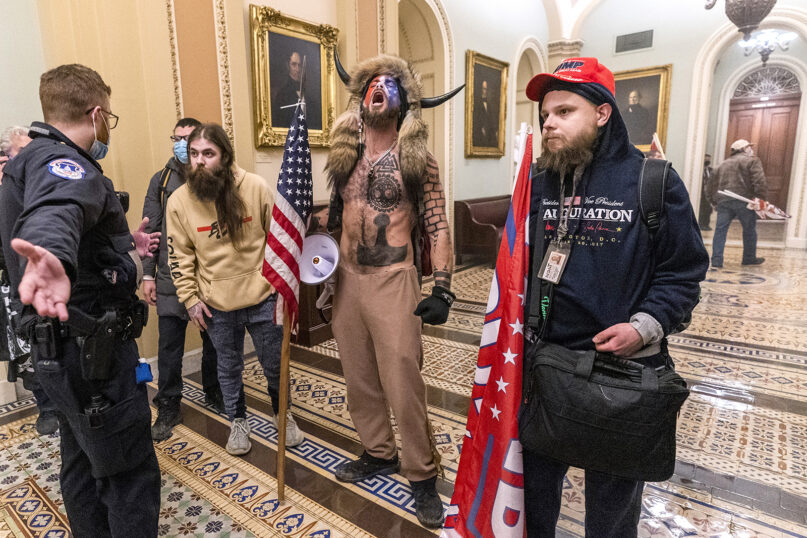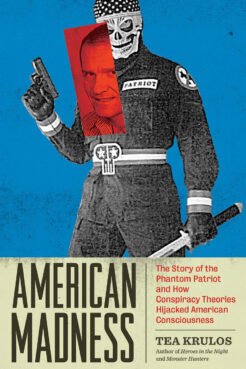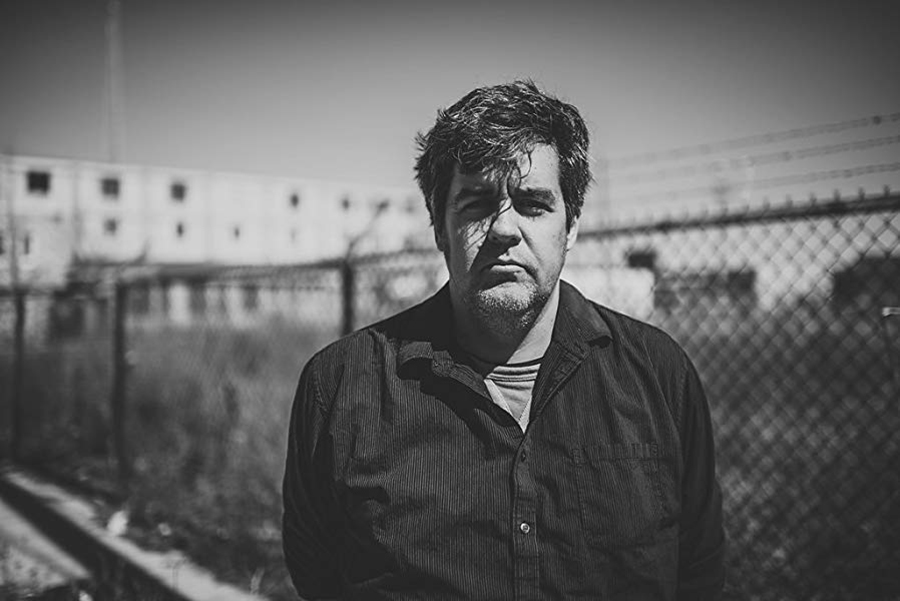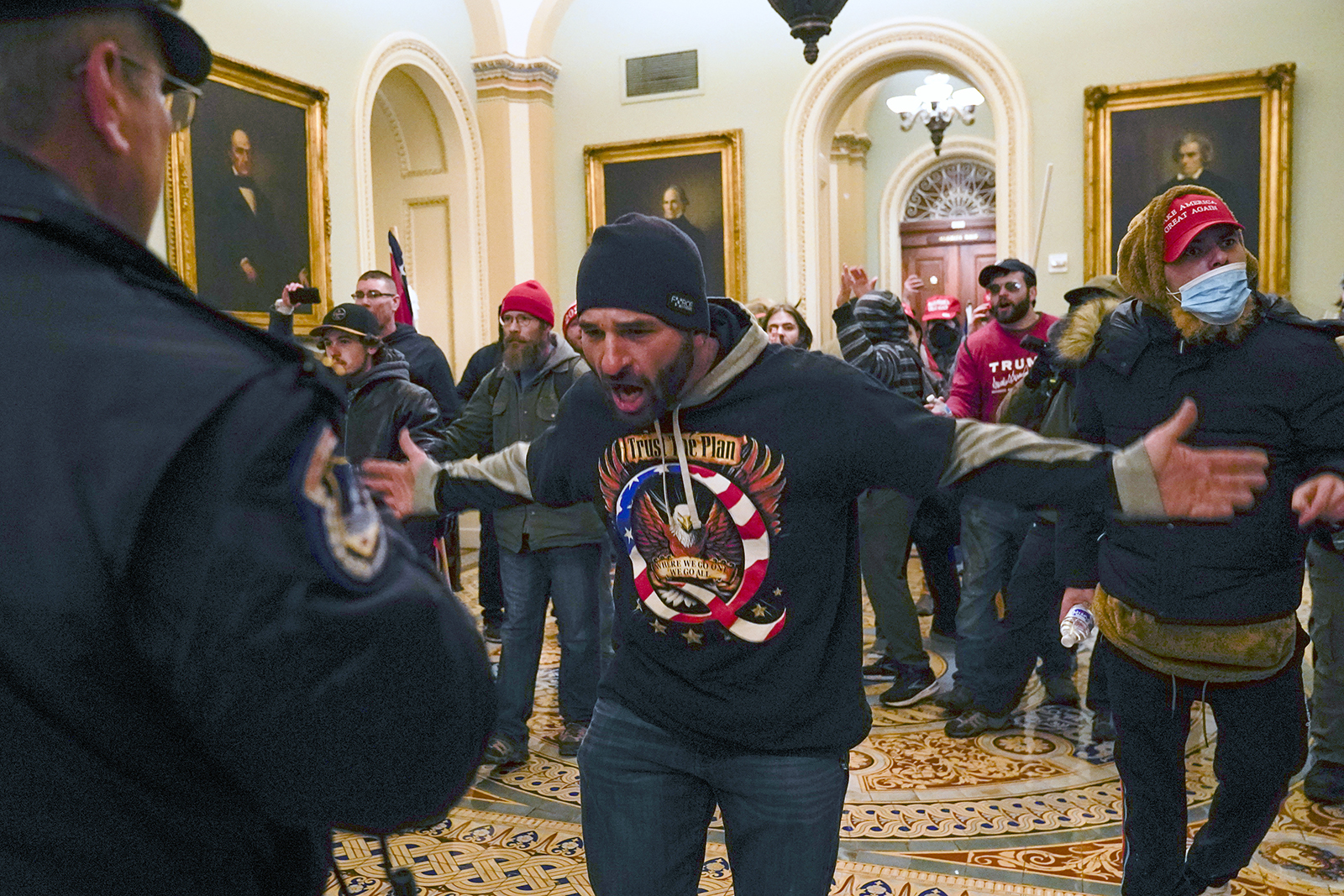Though it may seem like a modern plague, conspiracies have been with us for quite a long time. Generations of humans have been worrying about mysterious cabals and shadowy yet powerful figures for ages. In fact, strange conspiracy theories have been bubbling in the human consciousness for millennia, stretching back to ancient Romans fretting over who started the fire that burned much of their capital city in A.D. 64 (via Memory Studies). And, as Lapham's Quarterly notes, Jewish people in medieval Europe could be killed by mobs fueled by false rumors of a well-poisoning conspiracy, all supposedly put in place to eliminate the Gentiles. Around the same time, many also fretted about the specter of a secret yet immensely powerful network commanded by the Knights Templar, while others were constantly on the lookout for an as-yet-unrevealed Antichrist whose appearance had been prophesied in the Bible (per USC News).
When it comes to American history, conspiracies had a serious heyday in the 19th century. It makes sense given the nation was rocked by political parties constantly jockeying for power and increasingly dire tensions over the issue of slavery. Even after the nation had begun its recovery from the Civil War, conspiracies still lingered, pointing to hidden actors in the nation's political system. As so often happens with unfettered speculation over time, things could get pretty strange. These are some of the weirdest conspiracy theories in 19th-century American politics.
19TH CENTURY POLITICAL CONSPIRACIES DIDN'T COME OUT OF NOWHERE
American politics have nearly always been mired in some sort of conspiracy theory. Less than a decade after the American Revolution drew to a close in 1783, political parties were already volleying claims of backroom deals at one another.
The trouble began in the last decade of the 18th century. According to TIME, Massachusetts minister Jedidiah Morse seemed to be the source of the trouble, at least on American soil. In his sermons, Morse began to claim that the "Bavarian Illuminati" had infiltrated American society with the aim to upend both the newly-formed government and Christianity itself. He pointed to the revolution that was at the time tearing France apart, taking particular note of the atheistic Jacobins who were busy closing French churches and promoting a secular way of life. The Illuminati, he claimed, was also ready to promote a lurid way of life that laughed at notions of fidelity, chastity, and social order.
Morse went even further to tie in the future president Thomas Jefferson and his Democratic-Republican party. Morse was a devoted Federalist, counting himself among the political opponents of the Democratic-Republicans. Soon enough, others fell in line with Morse's alarmist thinking, including the president of Yale. As the new century dawned, the conspiracy fell out of favor but never fully went away. Even today, some Americans still fear that the mysterious Illuminati are running things toward evil, despite a considerable lack of evidence.
CATHOLICISM BECAME LINKED TO POLITICAL CONSPIRACY
In the early decades of the 19th century, American nativists were fighting for their rights against the invaders. Only these nativists were not American Indians indigenous to North America. Instead, as Smithsonian Magazine reports, they were members of a quasi-secret society who purported to be of "pure" Anglo-Saxon heritage. And the invaders? Well, Catholics, of course.
The society in question would eventually come to be known as the "Know Nothing" party, so called for its members' habit of feigning ignorance of the group when questioned. Though the political party would grow in power, its main fears centered on the notion that immigrants from majority Catholic nations, such as Ireland, were undermining the fabric of American society.
The United States in the 1840s was indeed accepting a wave of Irish Catholic immigrants, as Politico reports. According to this conspiracy theory, these Catholics were not true Americans, instead holding allegiance only to the Pope, who was set on destroying Protestant America. To that end, Catholic representatives were said to be guilty of lurid misdeeds, such as murdering infants and kidnapping young women. Never mind that no evidence of such crimes was ever uncovered. In response to the accusations, the Know Nothings and other nativist political groups helped pass laws that limited alcohol consumption and restricted immigration. This made it all the more difficult for new arrivals to participate in civic life or even find employment in their new home.
THE KNOW NOTHING PARTY THRIVED ON CONSPIRACY
The Know Nothing party first took shape as a secret society, originally called the Order of United Americans, then the Order of the Star Spangled Banner. According to Smithsonian Magazine, the order eventually became an organization of powerful players, established its own political party, and reached its apex of influence in the 1850s. Know Nothings became governors and legislators throughout the nation, briefly becoming a serious force in American politics. They were elected largely because of their conspiratorial view toward immigrants, who they argued were intentionally destroying the American way of life. It wasn't just Irish Catholics who loomed unnaturally large in the political imagination. The Know Nothings positioned German immigrants and women's rights suffragists as equally nefarious groups. People became so riled up by these opportunistic political conspiracies that they burned churches and formed violent gangs.
The Know Nothings rose to prominence by playing on the fear and rage of their fellow Americans. But this was not a strong enough foundation and the group soon crumbled. As time wore on, it became more and more difficult for the party to ignore the issue of slavery, which it had tried to avoid. Furthermore, devotees of the party may have also realized that its vision of a United States peopled only by "pure" white Protestants was ridiculously unattainable.
ANTEBELLUM SLAVEHOLDERS FEARED A BLACK REPUBLICAN CONSPIRACY
In the lead-up to the American Civil War, political conspiracies became widespread and widely believed, according to "Plots, Designs, and Schemes." They also became more and more focused on what was surely the most divisive issue at that point in American history: slavery.
In the South, slave owners became convinced that agents from the North were infiltrating their communities and wreaking havoc to undermine their way of life. During the 1830s, one of the prevailing theories was that abolitionists were actually being directed by the British, who were intent on destroying rebellious American democracy (and economic competition). Others argued that the call was coming from inside the house and that bigwigs in the Republican Party were engaged in a conspiracy to outlaw slavery. They became known as "Black Republicans."
Some kernels of truth inflamed these conspiracies further. As The Guardian reports, Abraham Lincoln (himself a Republican), referred to the "ultimate extinction" of slavery in 1858. Although the party did work to limit the expansion of slavery, pre-Civil War Republicans did little to actually stop the practice or roll back the institution of slavery as it had been entrenched in the South. For some Southern leaders, those details didn't matter. William Harris, who advocated for the secession of Mississippi, wrote that his state "will never submit to the principles and policy of this black Republican administration." Though it wasn't true, the conspiracy clearly had some very real effects.
ABOLITIONISTS HELD THEIR OWN CONSPIRACY THEORIES
While Southern slave owners were becoming alarmed at the idea of outsiders actively working to disassemble their culture and economy, anti-slavery abolitionists had their own suspicions. The "slave power" conspiracy alleged that slave owners had already infiltrated all levels of the government and were working to make their way of life the norm for all (via "Plots, Designs, and Schemes").
Though abolitionists on their own may not have been able to make it all the way to the Emancipation Proclamation, "Plots, Designs, and Schemes" notes that they were given a boost by the "slave power" conspiracies and similar suspicions. Northerners who were previously indifferent to slavery or who even held some seriously racist beliefs began to believe that maybe, just maybe, the Southerners really were worming their way into too much power. Some even alleged that it went all the way to the top, with the president himself either one of them or too weak to resist the "slave power" conspirators.
Though there was no evidence ever uncovered to support this — in fact, that would have been diametrically opposed to the conspiracies popular in the South — the "slave power" suspicions seem to have united many disparate groups in the buildup to the Civil War. Scholars even argue that, strange as it may have sounded to some, this particular conspiracy led to the rise of the Republican Party in the 19th century.
SOME STATES SECEDED BECAUSE OF CONSPIRACY
While some American political conspiracies may have seemed laughable in the first decades of the 19th century, they became harder to ignore as time went on. Tensions over the issue of slavery grew, as did fights over just how states were supposed to handle the issue. Eventually, things reached a breaking point. On December 20, 1860, South Carolina became the first state to secede from the Union. According to the National Park Service, this and the following secessions were touched off by the 1860 election of Republican Abraham Lincoln. Yet a closer look at secession declarations shows that conspiracies played their role in the breakup, too.
In its declaration of secession, Texas was convinced the North had sent emissaries to wreak havoc in its territory. This didn't just involve undermining the culture of the South or spreading fear and doubt in the minds of Southerners. The purported misdeed also included more obvious crimes, including such nefarious acts as poisoning the water supply of communities and committing arson in towns throughout the state. According to The Atlantic, other states made similar claims, arguing that Lincoln and his allies wanted not only to upend their way of life but to simply kill Southerners. Given Lincoln's recorded intent to reconcile with the South after the Civil War ended — to the point where even his allies thought he was being too soft on the rebels (via History) — this seems all the more unbelievable.
REAL SLAVE REBELLIONS WERE WARPED INTO FEAR-MONGERING CONSPIRACIES
In the 19th century, American slave owners thought the threat of a slave rebellion loomed largely. Could enslaved people have grown so tired of their inhumane treatment that they were planning a large-scale revolt? The idea makes sense. According to Britannica, the Haitian Revolution concluded in 1804 after a rebellion ousted the French and established the first country to be run by former slaves. Was it such a stretch to imagine that a similar thing might happen on U.S. soil?
As The Atlantic points out, slave rebellion did occur in the U.S. So too did conspiracy theories abound of organized slaves on the threshold of revolution, perhaps helped along by the abolitionists. It didn't help that John Brown actually did attempt to encourage an armed uprising amongst slaves in 1859 Virginia. Never mind that his attack fizzled and Brown himself was executed later that year. For some, this was enough evidence to confirm a widespread slave rebellion plot, with a few indulging in fantastical tales of vicious, well-organized people who wanted nothing more than bloody revenge. It was only a short step from that to believe that emancipation would be nothing less than the end of all white people. However, as the rest of United States history after the 1863 Emancipation Proclamation has made clear, no such thing ever happened.
NEWSPAPERS TIED LINCOLN ASSASSINS TO A LARGER PLOT
On April 14, 1865, President Abraham Lincoln's outing at Ford's Theater ended in his assassination by actor John Wilkes Booth. According to History, Booth had assembled a small group of conspirators to first kidnap Lincoln. When that plan failed, they decided instead to murder the president.
But was the assassination really the work of only a few people? As Ford's Theatre reports, some thought that the plot was beyond the abilities of some second-rate actor and his friends. Almost immediately after Lincoln's death, newspapers began hinting that the president's demise was the work of a larger, more organized group of Southern rebels.
The roster of potential masterminds behind the supposed plot included Confederate President Jefferson Davis and Confederate Secretary of State Judah P. Benjamin. Old religious prejudices came into play, with some arguing that Benjamin (who was Jewish) was influenced by a larger network of anti-Lincoln European bankers. Or was it the Catholics? After all, weren't some of the Booth conspirators devout followers of the Pope? Could Irish-Americans, who had largely opposed the war and rioted against a Union draft, be behind it? Heck, the murder might even have been ordered by Union officials who weren't keen on Lincoln's soft approach to the former Confederacy. However, Ford's Theatre points out that none of these conspiracies were ever proven true. Instead, the consensus remains that the assassination was in fact the work of Booth and a few of his associates.
SOME CONSPIRACISTS LIED TO THE PRESIDENT HIMSELF
When it comes to conspiracies, one of their reliable throughlines is that they're usually bunk. For many, most conspiracy theories are utterly ridiculous, like the idea that we are ruled by lizards or that the Earth is flat. Yet, every once in a while, conspiracy theories turn out to be true, like when the Iran-Contra affair really was a conspiracy to sell weapons and fun a Nicaraguan rebellion, as reported by NewScientist.
In the 19th century, one conspiracy theory fooled even the president. But those involved believed they were doing it for a good reason, given that the president was dying. According to The Washington Post, it all began with an assassination attempt. On July 2, 1881, Charles Guiteau — himself the victim of a conspiratorial thought that had him believing he was a political force and not a mentally ill nobody — shot President James Garfield at a train station. Garfield's doctor attempted to find the bullet lodged in his body by digging around in the wound with unsterilized equipment and hands. The president lingered for weeks before dying of a massive infection on September 19. Before that, his doctors issued cheerful reports to the newspapers, saying that he was "sleeping sweetly" or that "his eyes have regained their old-time sparkle." This was apparently an attempt to bolster the confidence of both the American public and Garfield himself, though eventually even the doctors had to admit their lie when the president finally died.
THE CHINESE EXCLUSION ACT WAS BASED ON CONSPIRATORIAL THINKING
By now, it's probably painfully clear to everyone that, wild as they may be, conspiracy theories can have some very serious consequences in the real world. They've been used as excuses to start wars, gain power, and sell newspapers. Even when a conspiracy isn't quite poised to tear a nation to pieces, it can be used to alienate an entire group of people for no reason other than the fact that they are "different."
In the post-Civil War world of American politics, that concept may have reached its zenith with the Chinese Exclusion Act of 1882, which seriously restricted immigrants based on Chinese racial background. According to History, the act didn't come out of nowhere. It followed years of increasing worries that Chinese workers, who entered the country to work in the mining and construction booms of the mid-19th century, were going to bring society and the economy down. Real economic downturns, increasing labor competition, and concerns about "racial purity" led to the passage of the act.
Proponents of the act, such as San Francisco mayor James D. Phelan, alleged that Chinese immigrants weren't just somehow simultaneously barbaric and "cunning", but part of a larger force that would devastate America through disease and erosion of the much-beloved, vaguely-defined American way of life. This anti-Chinese sentiment, tinged with hints of conspiracy, sadly came to light again in the U.S. with the rise of the COVID-19 pandemic .
FOR PICTURES & GRAPHICS





